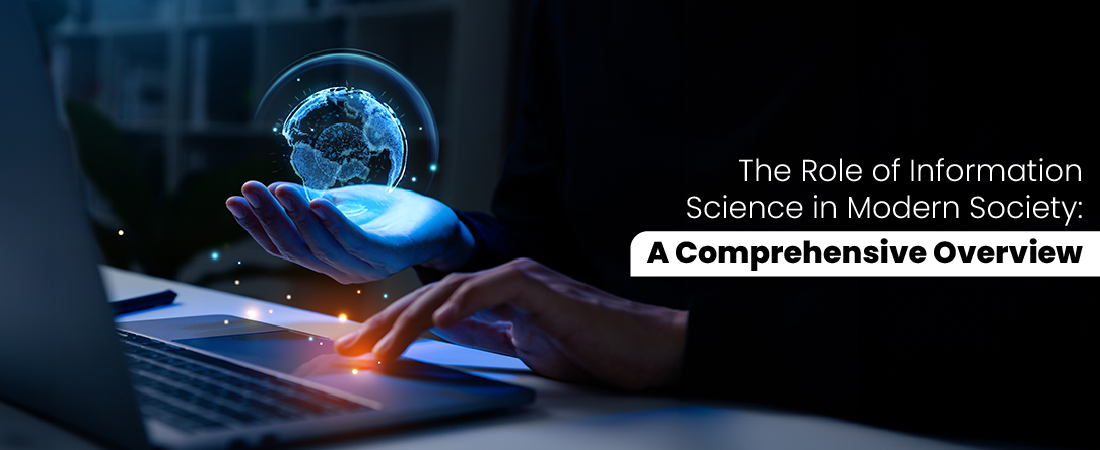
Information Science referred to also as information studies, is primarily related to the collation, storage, retrieval , classification, analysis, interpretation, movement, dissemination, and protection of all kinds of information. Experts in the domain specialise in the study and usage of information and knowledge within an enterprise, or a community based on the sphere of action. The activity involves collation of data between individuals, organisations and systems which would be processed to enhance efficiency, performance or deliver benefits depending on the application.
Information science is also termed informatics and is in the modern era connected with computer science, data, technology, library science, healthcare, and even intelligence and home security. Information science also reflects diverse aspects such as archival science, cognitive science, law, management, public policy and social science.
In modern societies, information science can be applied to regional and national policy making encompassing economic and social development. In fact our societies today are information societies where the creation, integration, usage and dissemination of information is central to the nation’s economic, political and cultural evolution, powered by computers, networks and telecommunication. This is in contrast to societies where the primary platform is either industrial or agrarian. An information society is a society where the usage and knowledge of information and computer technology is at a high level.
Information and Communications Technology (ICT)
The term Information Society is closely linked to Information and Communications Technology (ICT). ICT has a huge impact on every aspect of our lives and is a huge prime mover of social and economic change. Every facet of our lives such as shopping, banking, education, healthcare, socialising, entertainment and travel are influenced by ICT.
Characteristics of an Information Society
- Information societies are knowledge-based economies and not industrial economies. Most western economies, for example, retain the patents and IP of various products and services but outsource the execution to other economies.
- There is a growing importance of services over manufacturing. The US for example outsources most of its manufacturing to China, which is the world’s manufacturing hub. The US is a marketplace with China acting as a factory. In fact, the US even outsources various services like software development and customer support to other economies like India. A further reduction of costs is envisioned by the use of AI and robotics.
- A reflection of all knowledge-based economies is a spurt in creative industries and pursuits. This could be in the areas of entertainment, information and education. Also, since the communities are finely evolved, members can express their personal preferences which are catered to, leveraging modern communication technologies.
- Information science has given rise to the evolution of the knowledge worker. In an agrarian society, the principal employment is farming. In a manufacturing society, it’s the factory/ industrial worker. In an information society, the individual will have a minimum skill, is literate and is involved in collating, storing, delivering or analysing information for the community.
The way to measure an information society is by studying a digital divide in its ecosystem. This is simply the gap between the ‘Haves’ and the ‘Have-nots’ of those who have access to Information and Communication Technology (ICT) and those who do not. So it is achieved by assessing the percentage of families with a computer, internet access and the percentage of individuals who have used the internet in the last 12 months.
The other way to measure an information society is with GKI (Global Knowledge Index). How much does a nation’s economy rely on knowledge-intensive activities? This is achieved by analysing criteria such as pre-university education, technical and vocational education, higher education and research, innovation and development, ICT and a general enabling environment.
While the penetration of computers in India was very modest even after the IT revolution, the mobile revolution changed it all. According to Statista, the number of smartphone users in India was estimated at a staggering 1 billion, which means a very large number has access to Internet content. With rich media flowing in, literacy is not mandatory to access data as video content is consumed by a large populace, particularly in rural areas.
What gave further impetus to the utilisation of mobiles and other smart devices is the number of schemes from the Central Government. The Aadhar project is a global landmark - a repository of approx. 1.3 billion Indians in secure servers, working as a backbone for a host of services from mobile connections to bank accounts.
The Unified Payments Interface (UPI) is another milestone reflecting the power of Information Science. With their Aadhar number linked to bank accounts, recipients can receive payments into their bank accounts directly through the DBT scheme (Direct Benefit Transfer), a revolution when it comes to large volume payment delivery. According to Upstox, the government of India has established 450 programs and served over 900 million individuals since the commencement of DBT.
While large sections of the Indian population are still illiterate and economically underprivileged, India is definitely moving towards becoming an information society. The spread of illiteracy and the delivery of education, healthcare and other essential services powered by ICT will go a long way in enabling this transformation, a critical component of Information Science.
Dayananda Sagar Institute of Technology (DSIT), part of Dayananda Sagar Group of Institutions, offers a 3 year, full time diploma program in Information Science and Engineering. DSIT is one of India’s best established institutions in technical education and has excellent infrastructure backed by qualified and experienced faculty.
Developed with extensive inputs from industry experts, the curriculum reflects the requirements of communities, their information needs, and technologies available to deliver and manage such information. Successful candidates have been placed in some of the best names in IT in India and aboard.
Copyright © 2023 Dayananda Sagar Institutions. All Rights Reserved.